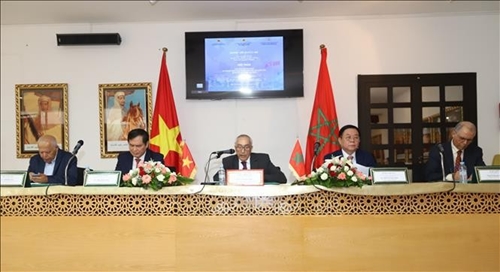The event was held by the Communist Party of Vietnam (CPV) Central Committee’s Commission for Information and Education, the Vietnamese Embassy in Morocco, and the Office of the High Commissioner for Former Resistance Fighters and Former Members of the Liberation Army of Morocco.
    |
 |
|
Some speakers at the workshop held in Rabat capital of Morocco on May 31 |
In his speech, Prof. Abdallah Saaf, Director of the Rabat-based Centre for Studies and Researches in Social Sciences, affirmed that President Ho Chi Minh had realized that only the strength of national solidarity combined with international solidarity could create the synergy necessary for the success of Vietnam’s revolution.
He said the Vietnamese people’s struggles, under President Ho Chi Minh’s leadership, substantially contributed to the national liberation movements in many countries in the 20th century. Apart from giving political support to and showing the solidarity with the fights for the right to self-determination and national independence worldwide, Vietnam also assisted many liberation forces in Asia, Africa, the Middle East, and Latin America by sharing experience and training officials.
Phan Xuan Thuy, Vice Chairman of the Commission for Information and Education, said with the historic Dien Bien Phu Victory that “resounded across the five continents and shook the globe” 70 years ago, Vietnam - Ho Chi Minh become a symbol of national liberation movements.
Together with Vietnam, a number of colonized peoples in the world and countries in Africa, from Algeria to Morocco and Nigeria, rose up to escape from the colonial and imperialist rules and gain independence and freedom, leading to the collapse of the old colonialism around the world, he added.
Mustapha El Ktiri, High Commissioner for Former Resistance Fighters and Former Members of the Liberation Army of Morocco, hailed the greatness of President Ho Chi Minh through the resounding Dien Bien Phu Victory, perceiving that the victory, under the President’s leadership, had positive impact on national liberation movements in Africa, marked the start of the liberation from the Western colonialists’ oppression, and kindled a strong hope among the oppressed peoples.
Addressing the event, Nguyen Trong Nghia, Politburo member, Secretary of the Party Central Committee and Chairman of the Commission for Information and Education, said looking back on the national liberation movements in Vietnam and Morocco, people nowadays even further treasure the two countries’ friendship, whose foundation was laid by President Ho Chi Minh.
Reviewing bilateral diplomatic ties, established in March 1961, he noted relations between the two countries took shape during the resistance war against the French colonialists in the 1950s. At that time, many young men of Morocco were forced by France to fight in Vietnam, but they were inspired by the land, people, and just struggle of the Vietnamese people under President Ho Chi Minh’s leadership, and then surrendered or joined the Vietnamese troops in protecting the country.
History is an important bridge connecting the Vietnamese and Moroccan peoples so that they work together toward a bright future of all-round cooperation, Nghia stated.
The workshop took place as part of a CPV delegation’s working visit to Morocco.
Source: VNA